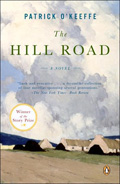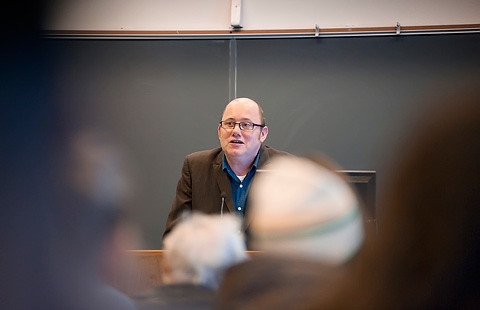 The Department of English kicked off this semester’s lecture series Thursday with a reading by a new member of the Â鶹Porn community, author Patrick O’Keeffe.
The Department of English kicked off this semester’s lecture series Thursday with a reading by a new member of the Â鶹Porn community, author Patrick O’Keeffe.
O’Keeffe, assistant professor of creative writing, won the prestigious Story Prize in 2005 for his collection of novellas, The Hill Road.
“The Hill Road is a glorious work one would wish everyone to read. What a pleasure to see so many students and faculty, so many members of our community at this reading,” Jane Pinchin, Thomas A. Bartlett Chair and Professor of English, said in the standing-room-only Ho Reading Room.
O’Keeffe was born and raised on a dairy farm in rural Ireland. He immigrated to the United States in the mid-1980s when he was in his 20s and worked as a bartender, construction worker, and house painter. He later began writing poetry and fiction, and in 1996 he earned a bachelor’s degree in English from the University of Kentucky.
Though critics often discuss his work in an Irish context, the author said that American literature was a strong influence on him.
He noted that people tend to absorb what they read, and he cited William Faulkner, Alice Munro, and Sherwood Anderson as just a few of his favorite authors.
On Thursday, he read from a work in progress called The Moon in Cancer, which revolves around a homeless character.
This work is a product of his experiences working with the homeless in Anne Arbor, Mich., where he attended the University of Michigan and earned his MFA.
O’Keeffe said getting to know the homeless men and women challenged his own limited notions of who they were. He urged the students in attendance to break away from their own comfort zones because coming face-to-face with the unknown often facilitates discovery.
He described the attitude writers must adopt to take risks in their work: “OK, I can’t get away with this, but I’m going to try and get away with this and hope it works.”
It also is important for writers to seek inspiration in everyday life, O’Keeffe said, because the smallest detail can lead to a creative breakthrough. Take that detail and write around it and through it to get at what fascinates you, he told the audience.
“Those images you have in your life, bring them to your work.”
 |
| Author Patrick O’Keeffe reads from his work at Lawrence Hall. (Photo by Andy Daddio) |